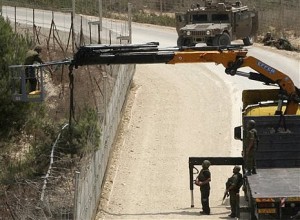The Israeli military said it would cut more trees Wednesday in the tense border area where Israel and Lebanon fought the most serious battle between the countries in four years, touched off by a dispute over a cypress tree.

The U.N. peacekeeping force in south Lebanon, UNIFIL, confirmed Wednesday that Israel was cutting down trees only on the Israeli side, the force’s spokesman Lt. Naresh Bhatt said.
Earlier in the day, an Israeli military spokesman, who spoke on condition of anonymity in line with military regulations, said the army was “continuing operations as usual” in the area and pruning trees.
“The U.N. announcement today clearly corroborates the Israeli version of events. Our routine activity yesterday was conducted entirely south of the frontier on the Israeli side and that the Lebanese Army opened fire without any provocation or justification whatsoever,” Israeli government spokesman Mark Regev said.
Tuesday’s clash highlighted the volatility of the frontier, where Israel and Lebanese Hezbollah militants fought a war four years ago.
Hezbollah did not take part in the latest violence, but the group’s leader, Sheik Hassan Nasrallah, said Tuesday night that his forces would not stand by idly if Israeli troops ever attack Lebanese forces again.
A fence that Israel erected is likely behind the confusion about which territory the tree is in. An Associated Press photo shows an Israeli standing on a crane reaching over the fence and into a wooded area, angering people on the Lebanese side. But the fence does not match the official, U.N.-drawn Blue Line boundary in all places.
Both Israel and Lebanon appeared to be trying to restore calm to the area.
Officers from the Lebanese and Israeli armies and UNIFIL were planning to meet later Wednesday along the border, the U.N. force’s spokesman Andrea Tenenti said. The gathering had been planned before Tuesday’s fighting, but it has taken a new urgency now.
Israeli Defense Minister Ehud Barak told Israel Radio: “I hope we will have a quiet summer and things will return to their normal course.”
Also Wednesday, funerals were being held for those killed Tuesday. In the Lebanese village of Darb el-Sim, near the southern port city of Sidon, the coffin of Lebanese Sgt. Robert Ashi was moved through the streets as people threw roses and rice on it in an Arab farewell gesture.
As the coffin was brought into the Notre Dam church and was later opened, Ashi’s mother Nada, and wife Terez fainted. Relatives carried the women outside the church and poured water on their faces. AP

Leave a Reply
You must be logged in to post a comment.